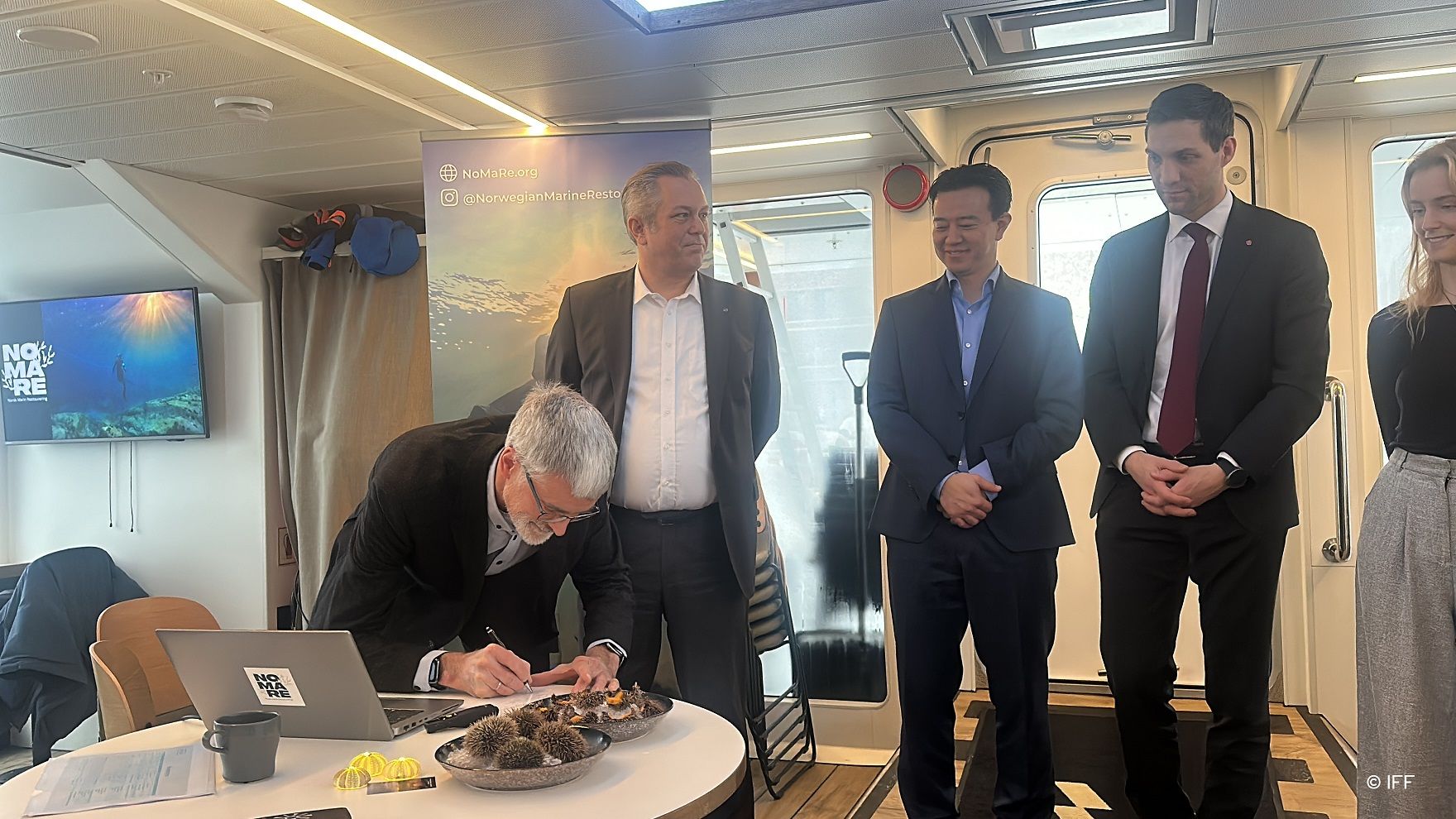IFF partners with NGO Bellona on project to restore Norwegian seaweed forests
IFF has partnered with the environmental non-governmental organization Bellona to collaborate on the Norwegian Marine Restoration (NoMaRe) project which aims to restore 5,000 square kilometers of northern Norway’s seaweed forests.
Trond Helgerud signs Norwegian Marine Restoration Project agreement along with Joakim Hauge from Bellona NGO; Brian Tsuyoshi Takeda, founder of Urchinomics; Andreas Bjelland Eriksen, Norway’s Minister of Climate and Environment, and Ida Søhol, co-leader of Tarevoktere. Image courtesy of IFF.

IFF has partnered with the environmental non-governmental organization (NGO) Bellona to collaborate on the Norwegian Marine Restoration (NoMaRe) project which aims to restore 5,000 square kilometers of northern Norway’s seaweed forests by managing invasive sea urchin predation. Regrowing the forests will could increase biological carbon sequestration by 12 million tons, explains the company in a press release. This is equivalent to Norway’s total oil and gas industry emissions in 2021.
“As one of the largest global users of seaweed for alginates and carrageenan, we are proud to be an initiator of this major project,” said Renee Henze, chief sustainability officer for IFF, in a press release. “Alginate from Norwegian seaweed is used in pharmaceutical applications, dietary supplements, and food, including new plant-based meat alternatives. Increasing advocacy for the often-forgotten seaweed forest is key to mitigating the effects of climate change, while creating sustainable jobs and products globally.”
The seaweed forests are the main food source and home to over 300 species of invasive sea urchins, whose numbers increased since the 1970s because human activity disrupted and removed many of the sea urchin’s natural predators. This caused the seaweed forests to become desert-like “urchin barrens” that harmed the biomass of native animals and plants, explains IFF.
The partnership is part of IFF’s commitment to its Do More Good Plan, as well as its Sustainability Solutions roadmap. The company is providing financial support and expertise in seaweed management to NoMaRe for a three-year period.
“The project has the potential to help Norway grow its marine economy by generating significant economic benefits every year, making sustainable seaweed one of the country’s biggest contributors to marine industries. That’s good for a greener economy and a greener planet,” said Trond Helgerud, principal scientist and seaweed R&D leader, Nourish, IFF, in a press release.
Kratom sees impressive sales growth despite its regulatory status and stigma
March 12th 2025Despite its controversy, kratom is a top-selling ingredient that consumers see value in. That said, brands need to work hard to demonstrate safety and quality of kratom products in the absence of legal regulatory status. Will kratom be able to overcome its stigma for even more growth and consumer acceptance?
DOJ asks Utah court to dismiss FTC lawsuit against Xlear Inc.
March 11th 2025On March 10, the DOJ and the defendant filed a stipulation to dismiss with prejudice the lawsuit in which each party agrees “to be responsible for its own costs and fees and agrees that no party shall be responsible to any other party for any fines, costs, fees, or penalties arising from this case.”
HHS announces efforts to eliminate independent conclusion of GRAS
Published: March 11th 2025 | Updated: March 11th 2025U.S. Department of Health and Human Services (HHS) Secretary, Robert F. Kennedy Jr., is directing the acting U.S. Food and Drug Administration’s (FDA) acting commissioner to explore rulemaking that would eliminate the independent conclusion of GRAS provision.











